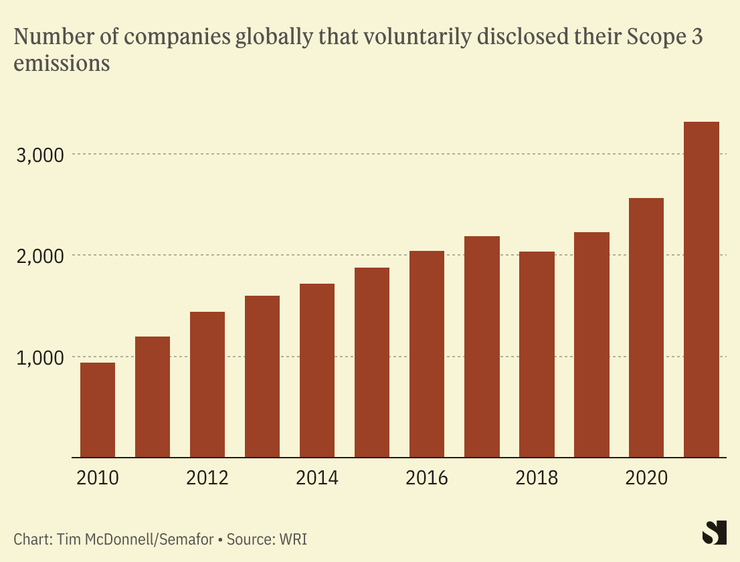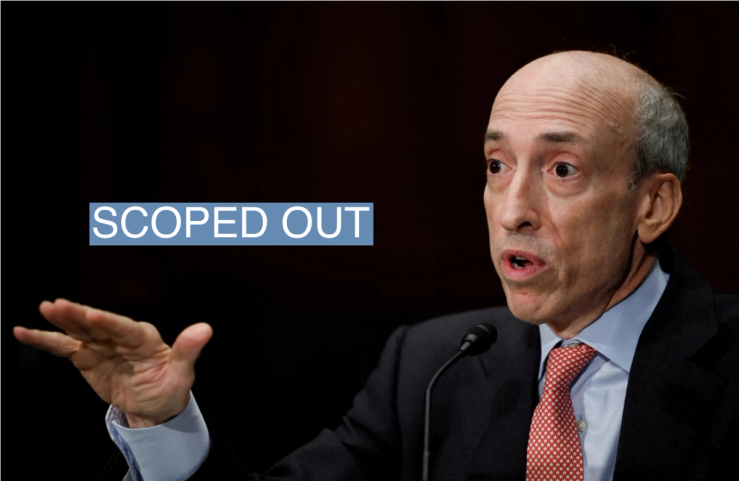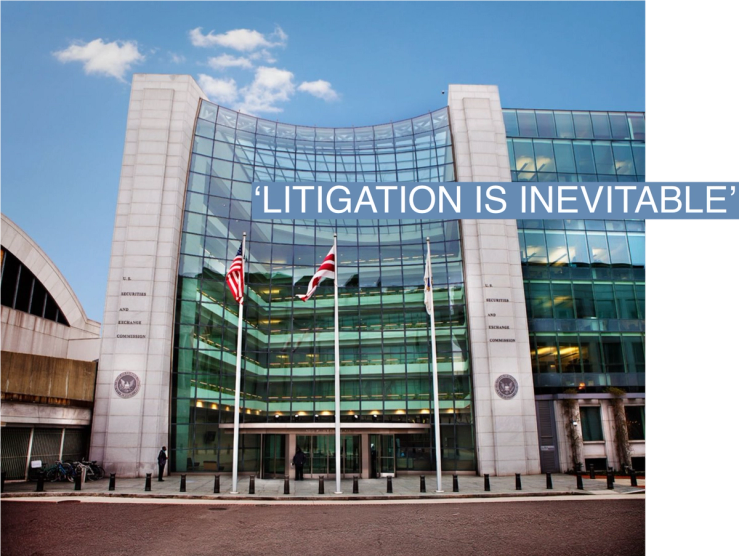The News
Lobbying groups on both sides of the U.S. political spectrum are gearing up to sue the Biden administration once it releases the final version of rules requiring publicly-traded companies to disclose their carbon emissions and other climate information.
The Securities and Exchange Commission’s climate disclosure rules have garnered a record of more than 14,000 public comments since they were proposed last March, with aggressive lobbying over a few key details since then. Environmental groups, Congressional Democrats, and other supporters say the regulations are needed to give investors visibility into companies’ climate-related financial risks, and to hold firms accountable for their climate targets. Opponents, including the U.S. Chamber of Commerce and many Republicans, say the rules are an overreach of the SEC’s authority and ask for data businesses can’t accurately or affordably obtain.
The final version of the rules is expected in the next few weeks, observers say — after which they’re sure to become the hottest battleground in the war over ESG investing.
Tim’s view
The debate over the SEC’s climate disclosure rules is rooted in the anxiety many carbon-intensive companies feel about the fact that CO2 emissions — once a vague metric that could at best be roughly estimated — are becoming much easier to measure, and a basis for lawsuits and shareholder campaigns. Thanks to regulation, as well as technologies like satellite monitoring and blockchain accounting, the era of hidden emissions is ending.
The most controversial part of the SEC proposal deals with “Scope 3” emissions, those that arise from a company’s supply chain and its customers’ use of its products. For many carbon-intensive companies, including fossil fuel producers and major retailers, Scope 3 makes up the majority of their total carbon footprint. The proposed rule requires disclosure of Scope 3 emissions if they are material to a company’s finances, or if they are included in a company’s climate targets.
Universal Scope 3 emissions disclosure is central to the broader ESG fight, because it would allow investors to make a more nuanced judgment about climate-related financial risks — companies with a lot of Scope 3 emissions are most likely to face costs or asset impairments as the economy uses less fossil fuels and policymakers crack down on emissions. High-carbon companies that don’t take steps to mitigate that risk — by changing their business model, for example — could face higher costs of capital, see board members ousted by shareholders, or face legal action.
This month, SEC Chair Gary Gensler acknowledged a favored argument of opponents of Scope 3 disclosure, saying that the process for tabulating them is not as “well developed” as the process for Scope 1 (from a company’s direct operations) and Scope 2 (from purchased electricity) emissions.
That may be true, but it’s quickly changing, as the major accounting firms, as well as a host of startups, standardize Scope 3 tabulation. Many large carbon emitters, including Chevron and ExxonMobil, already measure their Scope 3 emissions and have targets to reduce them (at least in terms of emissions per unit of oil and gas sold). And no matter what the SEC decides, companies with operations in Europe will likely need to account for their global Scope 3 emissions anyway, as European Union regulators finalize their own disclosure rules, which are likely to be more strict.

“It just won’t be that hard of a question,” said Madison Condon, a professor of environmental and corporate law at Boston University who published a paper last week urging the SEC to “not back down” on Scope 3 requirements. “This is becoming so commonplace that Scope 3 is integrated into existing supply chain and basic accounting software. It’s literally just in Quickbooks.”
If the SEC axes the Scope 3 requirement, as the American Petroleum Institute — the main American fossil-fuel lobby group — and others have requested, it will likely face lawsuits from environmental and shareholder advocacy groups. If it doesn’t, it may face lawsuits from Republican attorneys general and groups like API and the Chamber. One middle-ground approach would be to phase in the Scope 3 requirement over time.
Then again, softening the blow on Scope 3 probably won’t be enough to keep the SEC’s lawyers out of court, since other details of the rules are also contentious, said Rob Schuwerk, executive director for North America at Carbon Tracker, a think tank.
“Litigation is inevitable, and the SEC will recognize that,” he said. “So there’s no real incentive to drop any of the controversial stuff.”
Know More
Another controversial element of the SEC rules has to do with how companies report climate-related risks in their detailed financial statements — for example, if an asset like an oil refinery might lose value more quickly than anticipated because of the energy transition, or if anti-deforestation policy could make agricultural land holdings less valuable. Such risks are generally not disclosed, according to a Carbon Tracker analysis last year of 134 carbon-intensive companies.
The proposed rule is highly sensitive to these costs, requiring their disclosure if they amount to more than 1% of the value of each line item in a financial report (typically, the SEC’s bar for a material risk is 10%). That number may be scrapped or watered down in the final rule.

Room for Disagreement
The rules also target physical climate risks — how exposed a company’s assets are to wildfires or flooding, for example. Although this type of risk is in a sense more tangible than transition-related risk, it may be difficult to pin down because of uncertainties and a lack of geographical detail in climate models. Although a growing number of firms offer physical climate-risk forecasts, scientists have complained about the widespread use of “black box” models using methodologies that are not open for review.
Some wiggle room in these estimates may be acceptable for a company trying to plan for the future in broad strokes. But it could become a problem when used as the basis for specific financial risk statements to investors. In a second paper last week, Condon argued that state and federal governments should invest more in public-access, highly granular climate impact modeling to improve the transparency and reliability of these projections.
The View From Walmart
The prospect of mandatory Scope 3 disclosure is putting some companies that have otherwise been at the forefront of emissions monitoring into an uncomfortable position. Walmart, for example, reported Scope 3 emissions for 2020 of about 162 million metric tons, 90% of its total. The company launched an initiative in 2017 to track and reduce supply-chain emissions, and claims to have avoided 574 million metric tons of CO2 since then, the equivalent of shutting off 150 coal-fired power plants for a year. Yet in a filing to the SEC, Walmart warned that through that experience, “we have come to believe that current Scope 3 reporting is unreliable,” and urged the SEC not to require it.
Notable
- Complying with these rules could cost an average company about $500,000 in the first year and less in following years, the SEC projects. But giving investors more clarity and assurance around a company’s climate risks will likely lower the cost of capital by much more than that, Columbia University accounting professor Shivaram Rajgopal argued in a filing.



